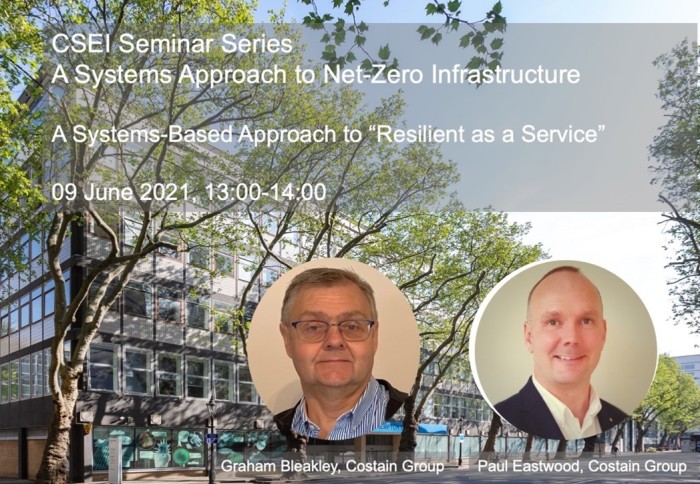A Systems-Based Approach to ‘Resilient as a Service’ – Costain

A Systems-Based Approach to ‘Resilient as a Service’ – Graham Bleakley, PhD and Paul Eastwood
Our 2021 Seminar Series continued on 09 June with a talk by Graham Bleakley, PhD and Paul Eastwood from Costain Group on ‘A Systems-Based Approach to “Resilient as a Service”’.
The aim of the presentation was to introduce Model-Based Systems Engineering and other complementing Systems Engineering tools, processes and practices to show how these techniques can be used to discover, define, develop, deploy and operate resilient infrastructure systems. In this context, resilient related to the systems behaviour, applying simulation-based methods to verify systems understanding and to help identify and protect the system against potential failures. Modelling in the systems-based approach helps develop and capture the information and complex interactions in a standardised way, enabling the use of such information to develop insights into the system so that more resilient and efficient systems can be created.
The speakers opened their talk by saying that the Costain Group is not just about delivering mega projects but also about integrating physical and digital infrastructure delivery. Their digital capabilities are organised around three service offerings
- Digital advisory
- Digital products and services
- Digital integration
In order to achieve optimal integration and delivery to ensure resilience in increasingly complex and sophisticated projects, they are developing a systems-based approach. However, to implement this approach, a sine qua non understanding the challenges facing infrastructure and the changes within infrastructure itself. Moreover, it is important to identify what the speakers called the ‘Pains’ of systems thinking, namely some of the hurdles to be overcome, for instance
- Siloed thinking
- Lack of interaction between design/build and operation
- Lack of communication between disciplines
- Increasing complexity
- Importance of interfaces, functionality
- Change from traditional project management approaches to agile practices (SaFE)
However, these ‘Pains’ are by far outweighed by the ‘Gains’ of adopting a systems-based approach since systems thinking
- Improves collaboration
- Leads to learning
- Leads to Systems Engineering practitioners acting as facilitators
- Breaks down silos
- Provides a common language

In short, a Systems Engineering approach leads to changes in process whereby it is easier to flesh out emergent properties and interfaces and to define consistent interfaces (functional, physical and organisational). Breaking down silos leads to greater understanding of emergent properties
In short, the most important requirement for Systems Engineering to succeed is effective communication between functions and to identify the interdependencies between these functions. In order to achieve resilience as service, it is then fundamental to understand emergent properties through modelling which results in identification of unknown risks and opportunities.

A Systems Engineering approach makes this possible. Although this might sometimes appear counterintuitive, it does lead to identifying requirements to mitigate against risks or realise opportunities. This is particularly important if we want to design and deliver whole lifecycle infrastructure solutions which will help us achieve Net Zero targets by 2050.
Graham and Paul added that their proof of concept on a systems approach to infrastructure and resilience as a service is based on Centre for Systems Engineering Innovation’s (CSEI) work on sewage management, and that they see CSEI as valuable partners to help explore these areas and facilitate the uptake of Systems Engineering in infrastructure, by breaking down silos and going from the informal to the formal.
The speakers stressed that, by facilitating optimal integration of all the elements of the system, a Systems Engineering approach allows for an output that is more than the sum of its parts.
To watch a recording of the event, click here.
To learn more about our research visit our Research Areas page.
To join us and help us make our research vision come to life, see our Get Involved page or email our Research and Engagement Manager Jeni Giambona, j.giambona@imperial.ac.uk.
Sign up for our Newsletter to be notified of our future events and research highlights.
Article text (excluding photos or graphics) © Imperial College London.
Photos and graphics subject to third party copyright used with permission or © Imperial College London.
Reporter
Jeni Giambona
Department of Civil and Environmental Engineering